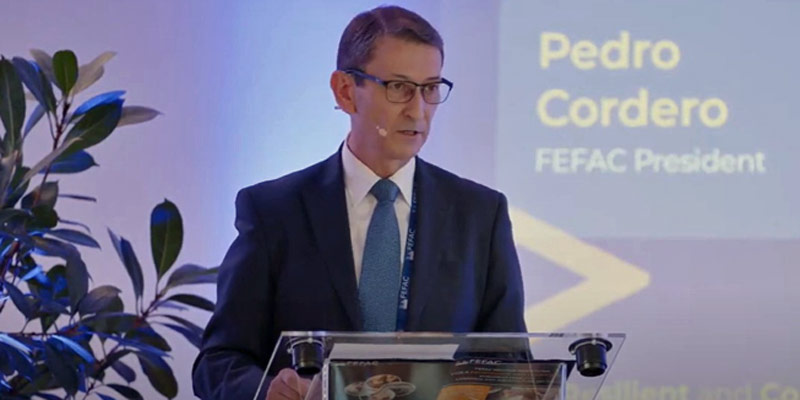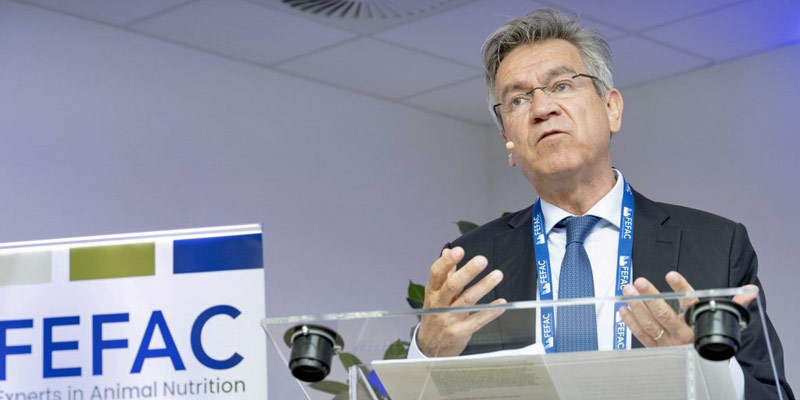Animal feed innovation, sustainability and circularity - highlights from FEFAC's Annual Public Meeting 2024

Feed manufacturers and their representative associations from across Europe came together in Brussels for the Annual Public Meeting of the European Feed Manufacturers’ Federation - FEFAC - on 31 May.
The 68th FEFAC Annual Public Meeting saw the Agricultural Industries Confederation (AIC) join as the representative trade association for UK-based animal feed businesses. AIC is a long-standing and active member of FEFAC.
This year's meeting was themed around "How to boost EU feed autonomy and strengthen circularity of the EU feed and livestock sector?" in the context of the new EU Strategic Agenda 2024-2029.
Click below to watch a video of the full meeting.
EU feed proteins strategy
The programme featured keynote contributions from Pierre Bascou (DG AGRI Acting Deputy Director General) and Patrick Pagani (Copa-Cogeca Deputy Secretary General).
Mr Bascou shared the updated European Commission EU Feed Protein Balance Sheet published on 24 May 2024 and a study looking at available options for feed proteins study which will inform a new EU Protein Strategy Report expected to be published in summer 2024.

Innovation and sustainability
Mr Pagani welcomed the more constructive political environment in the EU noting useful discussions between authorities and farmers on how to tackle sustainability issues.
He called on support from the feed industry by providing innovative technologies to EU livestock producers that can boost circularity and help achieve climate neutrality by 2050.

Other speakers emphasised the urgent need for the EU to accelerate support for the development of protein crops better adapted to changing growing conditions and to enhance EU self-sufficiency accompanied by calls for a swift movement towards adopting new technologies, including New Genomic Techniques (NGTs).
Circularity to cut carbon emissions
A session was dedicated to the key market and regulatory drivers to increase circularity and reduce carbon emissions, Christian Holzleitner (Head of Unit, DG CLIMA) highlighted the need for the agriculture sector to make further efforts in carbon emissions reductions and removals.
He stressed the European Commission’s objective to integrate the livestock sector into the carbon certification framework by 2025 while exploring the possibilities for emissions trading in the agricultural sector, as part of the effort to stimulate the uptake of innovative business solutions.
Speakers highlighted the need for improvements in the regulatory framework that would remove hurdles that currently hold up investments in developing innovative technologies in seeds, plant protection products and feed additives.
Alexander Romme, European Former Foodstuff Processors Association (EFFPA) President, raised awareness of the solutions former foodstuffs can deliver to both increased circularity and reduced carbon emissions in livestock farming, calling for consistency across EU sectoral policies to ensure nutritional feed resources are not diverted to biomethane production.
EU policy recommendations
FEFAC President Pedro Cordero said: "It is clear that the feed sector has a crucial role to play in supporting a vibrant European livestock sector that can improve its performance on elements such as reduced strategic import dependencies, reduced carbon emissions and increased circularity.
"FEFAC therefore presented its 12 key recommendations for the EU Strategic Agenda 2024-2029 regarding the livestock sector to the Belgian EU Council Presidency."
AIC noted that some of the policy asks for the EU within the FEFAC recommendations would be useful to place in front of a new UK Government. This includes:
- Ensuring "long-term" food security with policies designed to encourage the domestic production of essential feed ingredients
- Prioritising policy measures designed to increase the production of specific protein crops
- Maintaining access to co-products from the bio-economy for the compound feed sector, upholding the principle that biogas expansion should not take place at the expense of biomass used for feed and food production
- Innovation and research should foster safe nutrient recovery from resources currently unavailable for feed use, such as feed produced from insects and algae grown on waste-based substrates
- Promoting investment in essential feed additives manufacturing capacity within Europe (vitamins, amino acids) by recognising their status as critical materials will enhance the feed industry’s resilience.
- Targeting research and development programmes designed to deliver scaleability on alternative feed materials, including algae products, insects, single-cell proteins and fermentation biomass.



